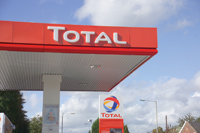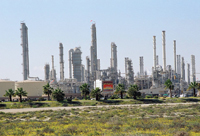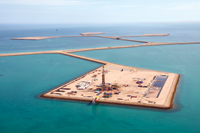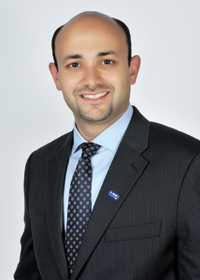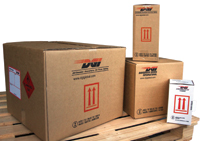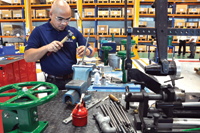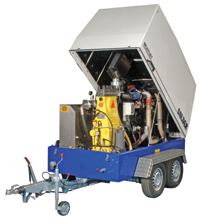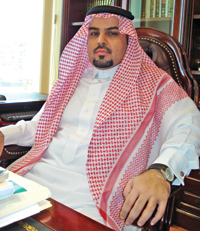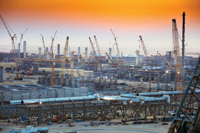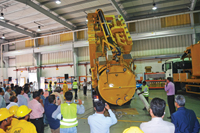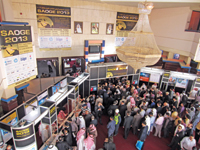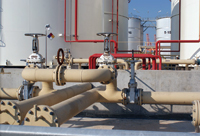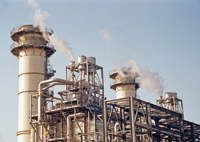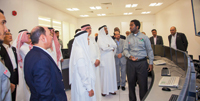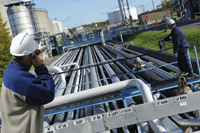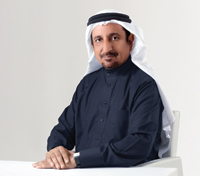
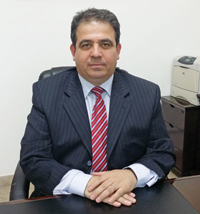 Dr Traboulssi ... we aim to be the first choice partner
Dr Traboulssi ... we aim to be the first choice partner
AFTER an initial start in the Middle East region, Sulzer Chemtech, a leading player in the fields of fluids separation and process technology, is seeking a new growth strategy which would fit better the requirements of the customers in the region.
“We are currently looking at growth in the Middle East in both, upstream and downstream, segments. We are particularly looking into developing opportunities for our products and services by working together with our customers – some of those are definitely in the GCC countries,” says Dr Rafic Traboulssi, managing director, and Head Mass Transfer Technology for Sulzer Chemtech in the Middle East & East Africa region.
TAPPING OPPORTUNITIES
What’s fuelling Suzler’s ambition for growth, clearly, is the vast opportunities being created by the current boom in the Middle East’s gas, refining and petrochemical sectors.
According to research firm IHS Energy, refining and related facilities in the GCC are estimated to exceed $80 billion of cumulative investment through 2020. While all plans may not reach the execution stage, a fair number have already broken ground.
Given that, Sulzer is currently readying itself to tap the opportunities expected from the large-scale investments happening in the petrochemicals sector in the region, says Traboulssi.
According to him, the Middle East and the rest of oil-producing countries have embarked on massive investments to diversity their economies and minimise effect of the shale gas boom in North America. This has resulted in the manufacturing sector receiving more attention in the GCC while drawing up strategic economic policies and investment plan.
“As a group, we are a world leader and set standards in the field of Mass Transfer Technology (MTT), and in the long term, our vision is to be the first choice partner to key customers in the region.
“We offer products and services for fluid separation, chemicals purification. We provide our customers with advanced solutions at the leading edge of technology which offer them reliability and sustainable competitive advantage in manufacturing their products. The company is also active in the field of mixing and dispensing systems. Sulzer Chemtech benefits customers from its global network of knowledge and competence through its local operations.
For instance, our operation in Bahrain provides process design and after sales support to our customers in the region which enable them to act quickly and get resolved problems our customers may face with the operation and maintenance of their plants.
“We also plan to work out strategic partnerships to ensure our customers benefit from state-of-the-art technological products and support services. Considering the niche position we have created for ourselves in the field of MTT, we, no doubt, will ensure its availability to our key customers who certainly want more and more complete services and solutions,” he adds.
HISTORY
Part of the Sulzer Chemtech Ltd, a member of the Sulzer Corporation, with headquarters in Winterthur, Switzerland, the Bahrain-based Sulzer Chemtech Middle East serves a number of industries with products and services widely used in thermal separation processes such as distillation and absorption which are applied across oil and gas, hydrocarbon and petrochemicals processing, and other industrial manufacturing processes.
The company entered the region by opening a base in Bahrain way back in 2008 to serve the entire Middle East and East Africa region. After an initial start, Sulzer says it has gradually gained a considerable market share of the multi-million MTT regional market.
“Historically, in the region, our competitor had enjoyed a larger installed base while our presence was limited to some niche chemical applications only. But, today, we are catching up. Since we came in the region we have gained good presence in Saudi Arabia and our products are used in the large size refineries and petrochemicals expansions,” says Traboulssi.
NEW PLANS
The company is now scaling up and looking to grow substantially over the next few years, says Traboulssi. The company is ready to draw in expertise from its global operational excellence centres to support local customers with their requirements. On the other hand, should the market not develop in line with the expectations or if investments get delayed, the company is flexible enough and can adjust its operation to suit market size and activities, as required.
Continuing its focus on the oil and gas sector, the company now plans to reposition itself from being just an original equipment manufacturer (OEM) to a full-fledged solutions provider. This is in keeping with the increasing market demands which indicate that the trend is to provide customers with full solution and extended scope. That is what customers want, says Traboulssi.
“Customers want to work with suppliers who can offer engineering services as well as equipment, and field services. Components suppliers would only achieve a very limited growth in the future if they did not adjust to the new market trend,” says Traboulssi.
“Therefore, no doubt, we would like to do more in this regard, expand our scope of activities and build up on current successes in the GCC. Ideally, we would like to be involved at the outset of a project where we can perform feasibility and process studies, make process recommendations and then execute the actual work at site,” he adds.
REVAMPS IN GCC
The company has already implemented major revamps for some of its customers in Saudi Arabia and Kuwait.
The company has been contracted to carry out the procurement and construction work for a vacuum distillation unit (VDU) revamp of one of Saudi Aramco’s affiliate, located in Yanbu Industrial City, Saudi Arabia. The work has been completed to a large extent, and some remaining work is being progressed.
The revamp is based on process and detailed engineering designs which was developed by Sulzer Chemtech. This significant project will increase the plant capacity by approx. 40 per cent which would enable the customer to meet local demands for its prime products and also to provide feedstock for a new expansion. In addition, the revamp of the VDU, includes the engineering, procurement, and construction of key process equipment e.g. heater revamp, new heat exchangers, piping, electrical installations, and instrumentation, as well as civil and structural work. “We see a large emerging market in this area where we can do business. We have done such business in the past but in a very limited way. We would like to grow and move into that direction, and we think we will fit in quite well in this segment,” he adds.
REVIVING BAHRAIN PLANT
Meanwhile, depending on market activities and future success the company may revive its plan to set up a local manufacturing plant to service the Middle East region. According to Traboulssi, the plan was shelved in 2009 owing to the global financial crunch and now is dependent on future local market growth.
GLOBAL FOOTPRINT
The company’s business operations are well diversified across different geographic markets. It managed to minimise the risks arising out of a specific geographical region by spreading its business across the globe but also remained dynamic and followed emerging markets “Like many other companies which have moved their operations from Europe to Asia, we also followed suit,” he adds.
The company operates a global manufacturing and service network with sheer number of locations worldwide. According to GlobalData, for the fiscal year ended 2013, Europe, Middle East, Africa accounted for 42.97 per cent of the company’s total revenue, followed by Americas with 34.62 per cent and Asia-Pacific with 22.41 per cent revenue. Such diversification supports the company’s expansion plans, as wider reach in terms of geography could lead to increased benefits, improved profit margins, economies of scale, and recognition worldwide.
CHALLENGES
Talking about the challenges the company faces, Traboulssi says at times the existing stringent regulations in the region hamper smooth functioning of organisations and projects alike as we have to operate within the boundaries.
“As investors we would like to see more freedom to contribute more to the growth of the economy of the region,” says Traboulssi.
“At the same time, we appreciate that local labour and market has to be protected. But there has to be some flexibility in the implementation of rules. Also, the laws should be introduced in phases and not overnight as it needs to be changed,” he adds.
OUTLOOK
“We are definitely going through a very interesting phase. Lots of investments in the region have been announced. The growth in the oil and gas, and petrochemicals sector is expected to continue in spite of the political uncertainties that loomed over the region, and which are hoped they will be settled soon and that will help the region.”
“We believe we are in the right place,” says Traboulssi.
“The wise strategy of constant investments in the oil and gas sector coupled with a return to political stability will ensure this region and its industry a prosperous future,” he says.
Sulzer Chemtech, he adds, is in the process of looking at its mid-range plan part of which is to look at the Middle East market and achieve growth in the local market over the next five years.






































































